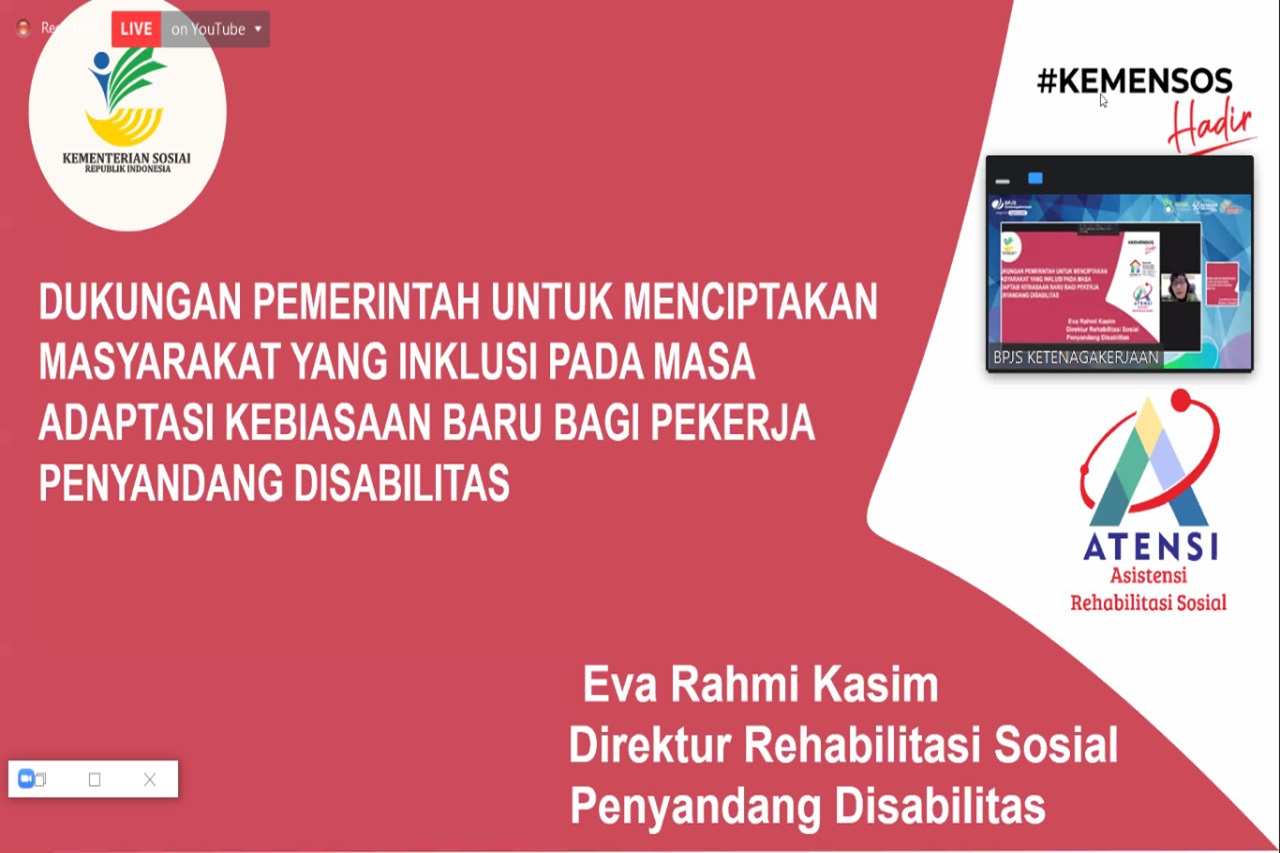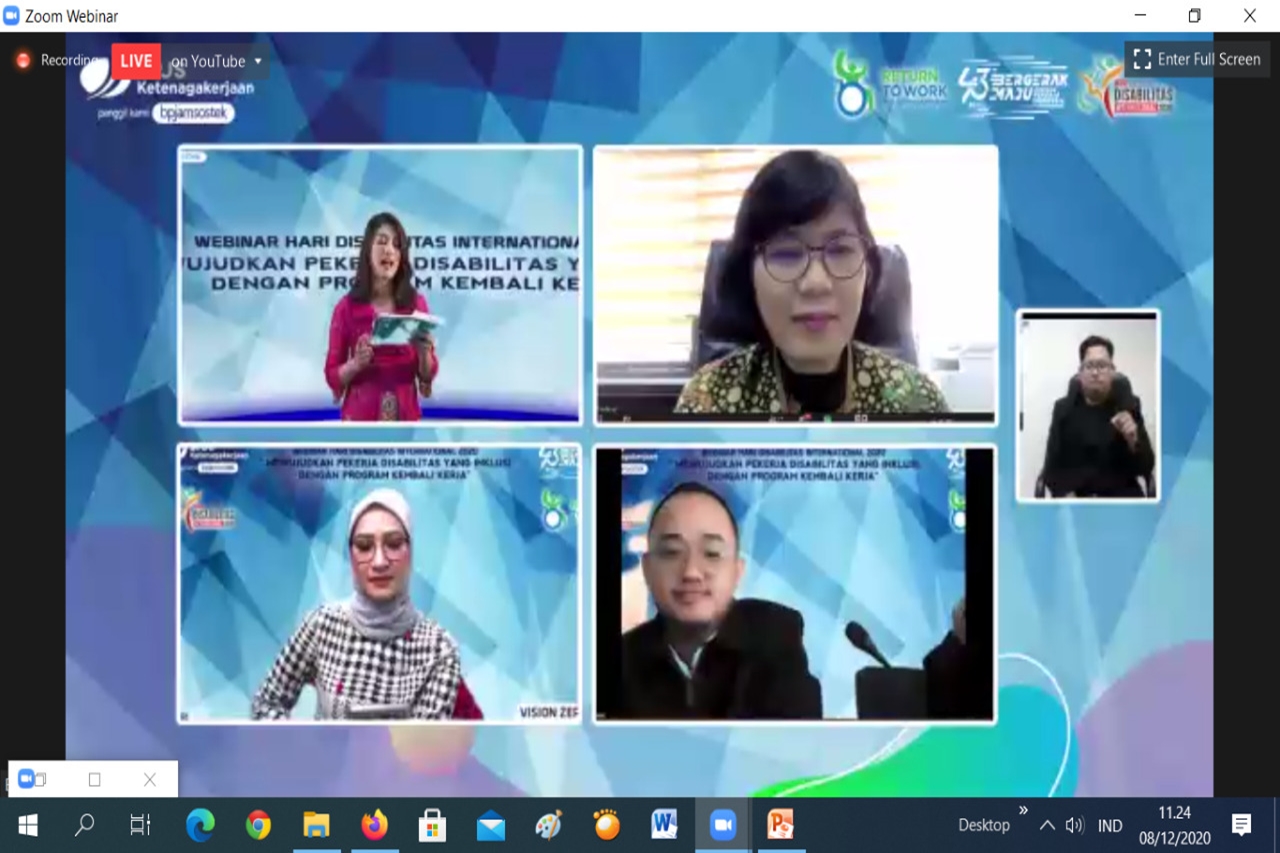JAKARTA (December 8, 2020) - International Disability Day 2020 with the theme "Rebuilding a better, more inclusive, more accessible, and sustainable life after the COVID-19 pandemic is a momentum to carry out reforms to improve access to employment for persons with disabilities.
Persons with Disabilities have equal opportunities in obtaining employment opportunities without discrimination. This has been mandated in Law no. 8/2016, it is stated that "The Government, Regional Government, State-Owned Enterprises, and Regional-Owned Enterprises are required to employ at least 2% (two percent) of Persons with Disabilities of the total number of employees or workers, and private companies are required to employ at least 1 percent, of the number of workers. It is even stated that it is not permissible to lay off a worker who has a disability for any reason, for they are also given the right to return to work. This was stated by the Director of Social Rehabilitation for Persons with Disabilities, Eva Kasim at the BPJS Employment webinar seminar.
Furthermore, Eva said that there are still many obstacles faced by people with disabilities to work in the formal sector, and there is a tendency for people with disabilities to work in the non-formal sector.
This is indicated by the fact that most of the education of Persons with Disabilities is still at the elementary school level, as much as 71% based on National Team for the Acceleration of Poverty Reduction (TNP2K) data in 2020 or even not attending school. "Persons with disabilities also experience obstacles in carrying out activities or participating because of the inaccessibility of work facilities and transportation, making it difficult for them to work in the formal field," said Eva.
Therefore, it is necessary to try to eliminate the existing problems by providing the widest possible access to them to enter the world of work, both in the formal and non-formal fields.
The Ministry of Social Affairs through the Social Rehabilitation Center for Persons with Disabilities tries to accommodate the needs of employers with the needs of persons with disabilities so that there is compatibility between the two parties.
Efforts that have been carried out by the Ministry of Social Affairs are by providing vocational and entrepreneurship training for the provision of work skills for Persons with Disabilities and internship opportunities (work practices), also in collaboration with Job Training Centers with the Ministry of Manpower and other ministries, as well as with various companies.
Persons with Disabilities have equal opportunities in obtaining employment opportunities without discrimination. This has been mandated in Law no. 8/2016, it is stated that "The Government, Regional Government, State-Owned Enterprises, and Regional-Owned Enterprises are required to employ at least 2% (two percent) of Persons with Disabilities of the total number of employees or workers, and private companies are required to employ at least 1 percent, of the number of workers. It is even stated that it is not permissible to lay off a worker who has a disability for any reason, for they are also given the right to return to work. This was stated by the Director of Social Rehabilitation for Persons with Disabilities, Eva Kasim at the BPJS Employment webinar seminar.
Furthermore, Eva said that there are still many obstacles faced by people with disabilities to work in the formal sector, and there is a tendency for people with disabilities to work in the non-formal sector.
This is indicated by the fact that most of the education of Persons with Disabilities is still at the elementary school level, as much as 71% based on National Team for the Acceleration of Poverty Reduction (TNP2K) data in 2020 or even not attending school. "Persons with disabilities also experience obstacles in carrying out activities or participating because of the inaccessibility of work facilities and transportation, making it difficult for them to work in the formal field," said Eva.
Therefore, it is necessary to try to eliminate the existing problems by providing the widest possible access to them to enter the world of work, both in the formal and non-formal fields.
The Ministry of Social Affairs through the Social Rehabilitation Center for Persons with Disabilities tries to accommodate the needs of employers with the needs of persons with disabilities so that there is compatibility between the two parties.
Efforts that have been carried out by the Ministry of Social Affairs are by providing vocational and entrepreneurship training for the provision of work skills for Persons with Disabilities and internship opportunities (work practices), also in collaboration with Job Training Centers with the Ministry of Manpower and other ministries, as well as with various companies.
For employment in the non-formal sector, the Ministry of Social Affairs has a policy of organizing Peduli Sheltered Workshop (SWP) in accordance with a person's disability condition. Those who require more protection "The Ministry of Social Affairs has "Kartini" Center inTemanggung by providing motivational guidance, family involvement, involvement of Social Welfare Institutions (LKS) ) and local governments and their businesses can become independent people through the splash batik business, so the emphasis is on the importance of inter-sectoral assistance and collaboration as well as continuous guidance in the work program of Persons with Disabilities.
The Ministry of Social Affairs' policy on the Work Inclusion of Persons with Disabilities through Social Rehabilitation Assistance (ATENSI) is implemented directly or indirectly. Indirectly implemented by the Center in this case the Directorate of Social Rehabilitation of Persons with Disabilities, related to how the coordination between ministries/agencies and the central government with local governments.
"We are also pushing for a national action plan, preparing regulations, synchronizing data for Persons with Disabilities, social campaigns and increasing the capacity of Persons with Disabilities. In addition, the Ministry of Social Affairs also continues to strive to increase the capacity of Assistants for Persons with Disabilities as providers of social welfare services for Persons with Disabilities," said Eva.
For direct services carried out by the Ministry of Social Affairs' Technical Implementation Unit (UPT), namely 19 Social Rehabilitation Centers for Persons with Disabilities throughout Indonesia with a family, community and residential based approach. Center is not only a service center, but also a communication, information, education and referral center that is integrated with other programs.
The Ministry of Social Affairs' policy on the Work Inclusion of Persons with Disabilities through Social Rehabilitation Assistance (ATENSI) is implemented directly or indirectly. Indirectly implemented by the Center in this case the Directorate of Social Rehabilitation of Persons with Disabilities, related to how the coordination between ministries/agencies and the central government with local governments.
"We are also pushing for a national action plan, preparing regulations, synchronizing data for Persons with Disabilities, social campaigns and increasing the capacity of Persons with Disabilities. In addition, the Ministry of Social Affairs also continues to strive to increase the capacity of Assistants for Persons with Disabilities as providers of social welfare services for Persons with Disabilities," said Eva.
For direct services carried out by the Ministry of Social Affairs' Technical Implementation Unit (UPT), namely 19 Social Rehabilitation Centers for Persons with Disabilities throughout Indonesia with a family, community and residential based approach. Center is not only a service center, but also a communication, information, education and referral center that is integrated with other programs.
"Workers with Disabilities do not only work in the formal field but are also expected to work in the non-formal sector," hoped the President Director of BPJS Ketenagakerjaan, Agus Susanto, who attended this webinar. Persons with Disabilities are a multi-sectoral issue, therefore solidarity and cooperation are needed to build access to labor for them.
BPJS Ketenagakerjaan has a role to ensure that the workforce ecosystem in Indonesia synergizes with each other starting from the preventive phase to the curative phase. Approximately 80% of workers who experience accidents have returned to work through the Return to Work program. "Our hope is that there will be no work accidents by applying the Occupational Health and Safety (K3) rules," said Agus.
The role and challenges of disabled workers in realizing an inclusive society were conveyed by the Special Staff of the President, Angkie Yudistia. "Basic service and social protection strategies are implemented through population management programs, social protection, health, education, poverty alleviation and improving the quality of children, women and youth," said Angie. These programs are supported by productivity strategies through vocational education and training, higher education, science and technology and innovation as well as sports achievements.
An update on the design of the workforce inclusion program for Persons with Disabilities is needed so that they have equal access opportunities in the world of work to realize an Advanced Indonesia government.
BPJS Ketenagakerjaan has a role to ensure that the workforce ecosystem in Indonesia synergizes with each other starting from the preventive phase to the curative phase. Approximately 80% of workers who experience accidents have returned to work through the Return to Work program. "Our hope is that there will be no work accidents by applying the Occupational Health and Safety (K3) rules," said Agus.
The role and challenges of disabled workers in realizing an inclusive society were conveyed by the Special Staff of the President, Angkie Yudistia. "Basic service and social protection strategies are implemented through population management programs, social protection, health, education, poverty alleviation and improving the quality of children, women and youth," said Angie. These programs are supported by productivity strategies through vocational education and training, higher education, science and technology and innovation as well as sports achievements.
An update on the design of the workforce inclusion program for Persons with Disabilities is needed so that they have equal access opportunities in the world of work to realize an Advanced Indonesia government.
 Bahasa
Bahasa
 English
English



